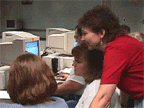|

|

|
- Professional
Development Formats
 - Keynotes
- Presentations
- Workshops
- Multi-Day
Options
- Partnerships
- Consulting
-
|
- Professional
Development Formats
-
- Although Annette is no longer consulting, this page has been left as part of the LLG archive.
Educators have
many options for meeting their professional
development needs. They may participate in a
workshop or inservice, attend a regional or
national conference, or collaborate in a grade
level project. We encourage organizers to
explore alternative approaches to professional
development including ongoing partnerships,
mentoring projects, and individualized
enrichment programs.
Keynotes
- Annette Lamb
has conducted numerous keynote addresses during
the past several years. Unlike traditional
"speeches", her presentations are intended to
information and entertain. She has included
costumes, props, audio, video, graphics,
audience participation, and other elements to
make her audience of thousands feel like a small
group of friends. In Strap on Your Spurs,
she compared "cowboy quotes" to life in the
classroom. In Welcome to the Funny Farm,
she used a Fisher-Price See-N-Say to compare the
animals on the farm to life in a library/media
center. In Technology Trailblazers, she
gets the audience to sing the theme songs from
Davy Crockett and Daniel Boone. In Gardening
in the New Millennium, she wears kneepads
and carries a water-bucket around while
discussing the "weeds" found on the Internet and
how to "harvest" the best Internet sites. The
Student Starships, she uses books, beanie
babies, and a model spaceship to demonstrate
ways to motivate children through
technology-rich projects.
|
- Whether you're
looking for a more serious speech related to
issues on Internet Integration or a fun approach
to living in a technology world, consider a
keynote by Annette Lamb. Follow-up support
materials for keynotes, presentations, and
workshops are provided by online materials at
eduScapes.
-
- Technology
Landscapes: Adapting to Changing Learning
Environments is a popular new keynote that
explores the "As" of the classroom technology
landscape including how to apply good practice,
adapt current skills, activate learning
environment, address individual differences,
acquire new partners, and advance new ideas.
-
- Ringmasters,
Clowns, and Tightropes: Educational Technology
Management and Leadership is an exciting
keynote or workshop that focuses on important
questions facing teachers and
administrators.
|

|
Presentations
- Full of practical
examples, "real-world" applications, and "user-friendly"
explanations, Annette Lamb is best known for her
presentations. Although it's easiest to simply select
from the presentation list, Annette can easily tailor a
presentation to meet your particular needs. Sessions can
focus on a particular PreK through university level or a
specific subject area. She has spoken at conferences for
every subject area from science and social studies to
language arts and vocational education. Although she
personally prefers the Macintosh, Dr. Lamb uses both Macs
and PCs in her examples and workshops.
-
- The presentation topics
generally combine an important educational technology
topic with an interesting or humorous theme. For example,
Open a Can of Worms: Managing Technology-Rich Engaged
Learning Environments, Roosting in a Cactus:
Planning and Assessing Technology-Rich Projects, and
Pigeon Power: Thinking Simple in a Complex
World.
-
- Generally, the
presentations are developed in Microsoft PowerPoint and
stored on a laptop computer. We'll bring the data
projector, you just need to supply the screen. The
presentations include screens from the Internet,
demonstrations from software packages, student project
examples, text, graphics, audio, video, photos, and
animation.
-
- Dr. Lamb is happy to
work with all types of groups including students,
parents, educators, and administrators. For example, she
recently spent a day talking to language arts classes in
grades 7, 8, 9, and 10 about reading and technology as
part of reading week.
-
- Workshops
- Any presentation lasting
more than 90 minutes seems to be given the name,
workshop. Regardless of whether the workshop is 2 hours
or 8 hours, they seem to fall into two categories:
"Hands-on Technology" and "Sit-N-Git". Both of these
formats have advantages and disadvantages.
-
- Hands-On Technology
Workshops. These sessions involve students working
individually or in small groups using the particular
technology such as computers, videos, scanners, or
digital cameras. Network access is needed for Internet
workshops and specific software may need to be installed
for workshops dealing with a particular software package
such as Inspiration, HyperStudio or Adobe
PhotoShop. The workshop combines short large-group
presentations and demonstrations with specific
on-computer activities and assignments. The advantage of
this format is that participants leave with very specific
skills related to the topic or software. This is most
effective when all participants enter the workshop with
the same set of entry skills. This format is
time-consuming. As a result, participants receive much
less "information" than in a presentation format. Less
motivated participants sometimes "mess-around" and slower
participants sometimes become frustrated. Hands-on
workshops often require extensive setup including the
assignment of passwords, software installation, and other
preparation that can be a problem with a "one-shot"
workshop. With good local planning and support, a
"hands-on" workshop can be one of the most effective ways
to get teachers to move from "knowing" about technology
to "integrating" technology into their daily classroom
activities. We can work with you to develop successful,
hands-on workshops. Focused topics work best for hands-on
workshops. For example, in a three-hour workshop teachers
can learn the LEAD (locate, evaluate, activate,
disseminate) model for Internet Integration or explore
the basics of using HyperStudio in the
classroom.
-
- Sit-N-Git
Workshops. These sessions are popular as part of a
conference or all-day, schoolwide inservice. The main
advantage is the ability to have a large group of people
participate in an expended, indepth experience with a
topic. Our workshops are categorized by the depth of
content ensuring that each participant gains "tons" of
practical ideas they can carry back to their classroom
and implement immediately. Generally these workshops
combine large group presentations with small group
discussions and "break-out" activities. Lots of handout
materials ensure that each participant leaves with useful
resources in hand. The advantage of this approach is the
volume of content that can be explored. In addition, this
format requires no special facility or setup and works
well with small or large groups. The main disadvantage is
lack of time working with the technology itself.
Educators aren't used to "sitting" all day, so breaks and
short, stimulating activities are important in this
format.
-
- Hybrids. We
sometimes recommend a combination of these approaches to
design a workshop best suited to your needs. For example,
the morning may be spent with large group activities and
the afternoon with a specific "hands-on" computer project
assignment. Learn about web development in the morning
and learn to use Claris Home Page or Web Workshop
Wizard online in the afternoon! Explore more short
and longer workshop topics below.
-
- Multi-Day
Options
- Although many of the
topics below can be introduced in one day, sometimes
multiple days are required to fully explore a topic or
learn to use a software package. This option may take the
form of extended workshops, credit or non-credit courses,
or ongoing-projects.
-
- Extended
Workshops. Sometimes one day just isn't enough to
feel competent and confident in the use of a new
technology. For example, in one day participants can
explore and integrate WebQuests into their
classrooms. With a second day, participants can learn to
develop web simple pages. These skills are combined on a
third day with small groups developing and creating their
own WebQuests for publication on the Internet. Some
sample topics for extended, hybrid workshops are listed
below. These are particularly popular in the
summer:
- LEAD - (Locate,
Evaluate, Activate, and Disseminate) Internet
Integration
- WebQuest -
Exploration and Development
- Web Development -
personal, class, project, and activity web page
creation
- Technology-Rich
Thematic Unit - Exploration and Creation
- Creativity Tools
- Communicating with Technology - writing, drawing,
painting, creating
- Multimedia -
HyperStudio - text, audio, scanning, digital cameras,
digital video
- Desktop
Publishing - combining text, graphics, scanned images
- signs, newsletters, fliers
- Imaging - KidPix,
Inspiration, to PhotoShop - scanning, digital cameras,
drawing, painting
- Meeting ISTE
Standards - grade level specific technology skills
and projects for teachers and students
-
- Credit and Non-Credit
Courses. Extended workshops can easily be developed
into one, two, or three credit courses. As a professor,
Dr. Lamb has taught a number of online courses. Your
school or organization may wish to have an on-site or
virtual course designed specifically for your
professional development needs! In addition, Dr. Lamb is
happy to work with the university in your area to offer
credit-generating courses in your geographic area. Some
of her courses mix live and virtual meetings with online
materials.
- Ongoing Projects.
The key to success with technology integration is ongoing
opportunities for professional development. Consider a
program that involves a series of workshops throughout
the year. Each workshop would ask participants to develop
and share a project in the time between workshops. Email
and online support can be provided during the development
months and new skills can be added with each workshop to
introduce new concepts and reinforce and review existing
skills. Participants are given fun, simple assignments to
keep their interest and motivation between workshops.
This approach is particularly successful with Internet
integration. Teachers begin by learning the basics and
integrating a few simple sites. By the end of the
project, they are developing their own online web pages
and projects.
- Partnerships
- Partnerships may be the
key to effective professional development. Whether it's
teacher-teacher mentorships, student-teacher teams, or
teacher-professional developer partnerships,
collaboration is the key to effective, ongoing
professional development. Educators need support,
encouragement, and meaningful ongoing projects. For
example as part of a "High Tech High School" grant called
EMPOWER, teachers spent five, half-days in the
summer learning to integrate Internet into meaningful
projects. Building level teams from each area high school
participated. The teams consisted of three high school
teachers, the library/media specialist, and a couple high
school students. The year-long project began with the
summer workshop, but also included three one-day
workshops during the school-day and ongoing email
communication within and among teams to develop skills
and meaningful projects.
- The key to effective
partnerships is ongoing commitment. Lamb Learning Group
is interesting in developing ongoing relationships with
schools. These partnerships may include grant writing,
program planning, workshops, web project support, and
consulting. If you already have a grant, we're happy to
tailor projects and activities that fit the requirements
of your grant. For example, schools in the Kansas City
area were awarded a challenge grant to develop
educational materials in conjunction with the Truman
Presidential Library. Annette Lamb provided a workshop
for their core group that addressed issues and topics
useful in The
WhistleStop Project.
She has also worked with the Village
Green,
Blazing
Trails, and
PrairieQuest challenge grant projects.
- Dr. Lamb is currently
working on a three-year project with the Evansville,
Indiana schools. For more information, check out the
website at iCATS.
- Consulting
According to the dictionary,
a consultant is "a person with a lot of knowledge and
experience who gives professional advice to others." Our
associates have lots of powerful ideas and practical
suggestions related to educational technology. We'd enjoy
the opportunity to share our experience with you in the form
of a presentation, small group discussion, or planning
session. Whether you're revising your technology plan,
developing your school website, or writing a grant, we're
happy to help.
[Overview]
[LLG
- FAQs]
[Annette
Lamb]
[Associates]
[Programs]
[Key
Ideas]
[eduScapes]
[V2A
Books]
Developed by Annette
Lamb,
November 1998. Updated 7/01.
|

